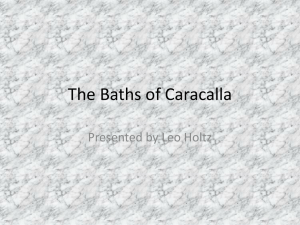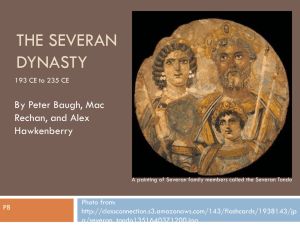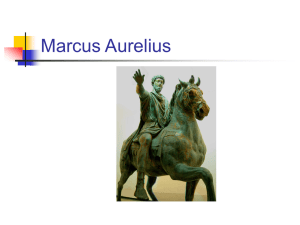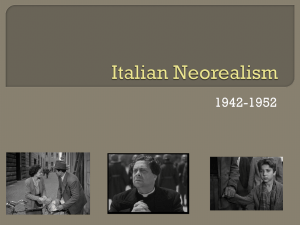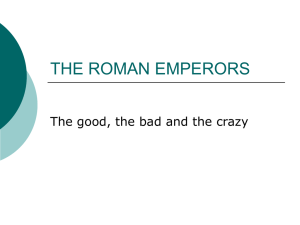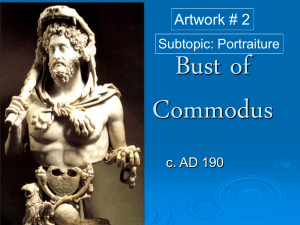Roman Emperors The Good, The Bad, and The Crazy
advertisement
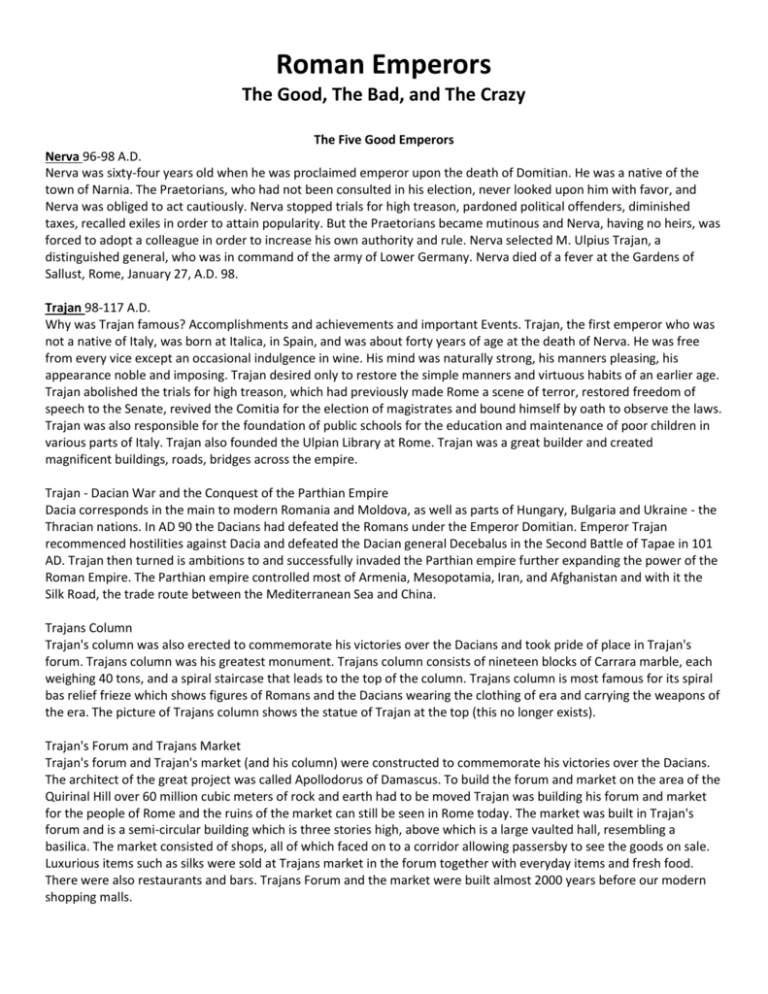
Roman Emperors The Good, The Bad, and The Crazy The Five Good Emperors Nerva 96-98 A.D. Nerva was sixty-four years old when he was proclaimed emperor upon the death of Domitian. He was a native of the town of Narnia. The Praetorians, who had not been consulted in his election, never looked upon him with favor, and Nerva was obliged to act cautiously. Nerva stopped trials for high treason, pardoned political offenders, diminished taxes, recalled exiles in order to attain popularity. But the Praetorians became mutinous and Nerva, having no heirs, was forced to adopt a colleague in order to increase his own authority and rule. Nerva selected M. Ulpius Trajan, a distinguished general, who was in command of the army of Lower Germany. Nerva died of a fever at the Gardens of Sallust, Rome, January 27, A.D. 98. Trajan 98-117 A.D. Why was Trajan famous? Accomplishments and achievements and important Events. Trajan, the first emperor who was not a native of Italy, was born at Italica, in Spain, and was about forty years of age at the death of Nerva. He was free from every vice except an occasional indulgence in wine. His mind was naturally strong, his manners pleasing, his appearance noble and imposing. Trajan desired only to restore the simple manners and virtuous habits of an earlier age. Trajan abolished the trials for high treason, which had previously made Rome a scene of terror, restored freedom of speech to the Senate, revived the Comitia for the election of magistrates and bound himself by oath to observe the laws. Trajan was also responsible for the foundation of public schools for the education and maintenance of poor children in various parts of Italy. Trajan also founded the Ulpian Library at Rome. Trajan was a great builder and created magnificent buildings, roads, bridges across the empire. Trajan - Dacian War and the Conquest of the Parthian Empire Dacia corresponds in the main to modern Romania and Moldova, as well as parts of Hungary, Bulgaria and Ukraine - the Thracian nations. In AD 90 the Dacians had defeated the Romans under the Emperor Domitian. Emperor Trajan recommenced hostilities against Dacia and defeated the Dacian general Decebalus in the Second Battle of Tapae in 101 AD. Trajan then turned is ambitions to and successfully invaded the Parthian empire further expanding the power of the Roman Empire. The Parthian empire controlled most of Armenia, Mesopotamia, Iran, and Afghanistan and with it the Silk Road, the trade route between the Mediterranean Sea and China. Trajans Column Trajan's column was also erected to commemorate his victories over the Dacians and took pride of place in Trajan's forum. Trajans column was his greatest monument. Trajans column consists of nineteen blocks of Carrara marble, each weighing 40 tons, and a spiral staircase that leads to the top of the column. Trajans column is most famous for its spiral bas relief frieze which shows figures of Romans and the Dacians wearing the clothing of era and carrying the weapons of the era. The picture of Trajans column shows the statue of Trajan at the top (this no longer exists). Trajan's Forum and Trajans Market Trajan's forum and Trajan's market (and his column) were constructed to commemorate his victories over the Dacians. The architect of the great project was called Apollodorus of Damascus. To build the forum and market on the area of the Quirinal Hill over 60 million cubic meters of rock and earth had to be moved Trajan was building his forum and market for the people of Rome and the ruins of the market can still be seen in Rome today. The market was built in Trajan's forum and is a semi-circular building which is three stories high, above which is a large vaulted hall, resembling a basilica. The market consisted of shops, all of which faced on to a corridor allowing passersby to see the goods on sale. Luxurious items such as silks were sold at Trajans market in the forum together with everyday items and fresh food. There were also restaurants and bars. Trajans Forum and the market were built almost 2000 years before our modern shopping malls. Hadrian 117-138 A.D. Why was Hadrian famous? Accomplishments and achievements and important events. Hadrian was descended from a family of Hadria, in Picenum and was a military commander, distinguished for his courage and activity. Hadrian adopted the policy of Augustus, refusing to extend the limits of the empire. His aim was to maintain and strengthen the existing Roman Provinces. Hadrian endeavoured to win the affections of the people by donations, games, and gladiatorial shows. He also cancelled a large amount of unpaid taxes and promised the Senators never to punish one of their body without their approval. He divided Italy into four regions, a Consular Magistrate being placed over each; and he introduced a new system of administration into the palace, the army and the state, which lasted until the reign of Constantine the Great. Hadrian was fond of travel and went on a journey through all the provinces of his empire, in order to examine into their condition and to discover and amend any faults in the system of government. The famous Pantheon in Rome was commissioned by Hadrian. Hadrian - The Jewish War A revolt broke out among the Jews and another Jewish war continued for several years, during which more than half a million of Jews are said to have perished. A famous general, Julius Severus, left his duties in Britain to lead the Roman armies and the rebellion was suppressed. The Jews were forbidden to live in Jerusalem or its neighborhood and the nation was scattered over the world. The Death of Hadrian Hadrian returned to Rome from his travels where he became sick. Hadrian adopted Arrius Antoninus (afterward the Emperor Antoninus Pius), and presented him as his successor to the Senators assembled around his bed. His illness affected the mind and disposition of Hadrian who became a cruel tyrant. Hadrian tried several failed suicide attempts due to his illness. He moved to Baiae, hoping for some relief in the fine climate of the Bay of Naples and he died there July 10th, A.D. 138, aged sixty-three. Hadrians Wall Hadrian's Wall was a Roman wall which formed a 73 mile frontier and barrier between the South and North of England. Hadrian's wall was built not just to prevent movement but also to control movement - especially the movement of the Picts. Hadrians Wall was built by Roman legionaries who belonged to the 2nd, 6th and 20th legions and took about 6 years to complete. Antoninus Pius 138- 161 A.D. Why was Antoninus Pius famous? Accomplishments and achievements and important events. The excellent Antoninus Pius was born at Lanuvium on September 19th, A.D. 86 although his family came from the town of Nemausis in Gaul. Soon after his accession to the empire he married his daughter Faustina to Marcus Aurelius and made him his associate in the government of the Roman Empire. His tranquil and prosperous reign was the most pleasing period in the history of the Roman Empire. The world enjoyed a general peace, and the emperor endeavored to secure the prosperity of his subjects. Antoninus Pius applied the public revenues to founding schools, repairing roads and harbors, and encouraging industry and trade. Antoninus made no attempt to extend the boundaries of the empire. After a reign of twenty-three years, Antoninus died, March 7th, A.D. 161, in his villa at Lorium, aged seventy-five years. Antoninus Pius - Justin Martyr and the Apologies for Christianity Apologists are writers who argue to defend or justify a particular doctrine or ideology that is viewed under persecutory examinations - such as Christianity. Justin was a Christian writer (later made a saint and called Justin Martyr) a philosopher and the author of the Apologies for Christianity. His apology was dedicated to Emperor Antoninus Pius and its purpose was to prove to the emperors, upright and philosophical men, the injustice of the persecution of the Christians. The Apologies for Christianity were addressed to Antoninus Pius, Marcus Aurelius and the Roman Senate. Justin later suffered martyrdom at Rome under the Emperor Marcus Aurelius. Marcus Aurelius 161- 180 A.D. Obtain a fast overview of the times of the Roman Emperor Marcus Aurelius from the following facts and information about his life. Why was Marcus Aurelius famous? Accomplishments, achievements and important events. Marcus Aurelius was known as the Philosopher, his morals and his intellect were trained by the purest and wisest men of his age. Early in the previous reign Antoninus Pius had made Marcus Aurelius his associate in the government of the Roman Empire. His health had suffered and Marcus Aurelius needed to share the government of the empire with his adopted brother, Lucius Verus, who was strong and healthy but was, however, addicted to all forms of licentious pleasures. Marcus Aurelius and the Parthian and German Wars The Parthian king, Vologeses III, invaded the eastern provinces. Lucius Verus was sent to quell the Parthians but left the fighting to his generals who succeeded in the task. The Parthians were based in Armenia, Mesopotamia, Iran, and Afghanistan providing access to the Silk Road, the trade route between the Mediterranean Sea and China. In A.D. 166 Verus returned to Rome claiming triumph. His army brought the plague with it from the East which desolated Italy and Rome. In A.D. 168 the twin emperors escaped the plagued city of Rome to go North to the Danubian provinces, where they mounted a military offensive against the threatening Germanic tribes. Verus died in A.D. 171 riddled with disease from his dissolute lifestyle. The war with the Parthians ended the peace at first experienced in the reign of Marcus Aurelius. Barbarians called the Marcomanni, a Germanic tribe, then rebelled. They were eventually quelled by Marcus Aurelius but at great cost to the Empire and Marcus Aurelius was forced to sell the imperial plate and jewels in order to provide a new army. An insurrection shortly followed in Syria, forcing Marcus Aurelius to defend this eastern part of the empire. In A.D. 176 Marcus Aurelius triumphed at Rome for his various successes. He gave a donation of eight pieces of gold to every Roman citizen, and made his son Commodus his colleague. In A.D. 177 Marcus Aurelius was again forced to march against the Barbarians. He contracted a fever at Vindobona (Vienna) in A.D. 180, and died after a few days' illness. Marcus Aurelius was the last of the Five Good Roman emperors who labored for the welfare of his people. Marcus Aurelius, the Christians and Justin Martyr Despite his reputation as a benevolent Emperor Marcus Aurelius allowed a cruel persecution of the Christians in A.D. 177. Among the victims of this persecution was the Christian writer and philosopher called Justin who was the author of the Apologies for Christianity which he had presented to the previous emperor Antoninus Pius and Marcus Aurelius. Justin suffered martyrdom and was later made a saint and called Justin Martyr. A couple of years later toward the close of his reign Marcus Aurelius become convinced of the falseness of the charges made against the Christians and became once more tolerant and philosophic. Evil Roman Emperors Tiberius 14-37 A.D. Why was Tiberius famous? Accomplishments, achievements and important events: Tiberius was cold and unpopular in his manners, awkward and even timid in his carriage, but a master of dissimulation. The only person of whom he stood in awe was his mother Livia; but he lived in constant fear of insurrection. Aelius Sejanus, the Prefect of the Praetorians, had long been the friend and chief adviser of the emperor. Sejanus was cruel, unscrupulous, and ambitious in fact the proper instrument of a tyrant. In A.D. 27 Tiberius hid himself in the island of Capri where he built twelve villas in different parts of the island living with a few companions. No one was allowed to land upon the shores of Capri except of course Sejanus and even fishermen who broke this rule through ignorance were severely punished. Every day, however, dispatches were brought from the continent and he still continued to direct the affairs of his vast empire. Sejanus was left to govern Rome but eventually Tiberius realised that Sejanus had become so powerful that he himself was at risk. Tiberius sent a letter to the Senate in which he denounced Sejanus as a traitor. Sejanus was flung into the Mamertine Prison, and there he was strangled in 31AD. The people of Rome threw his body into the Tiber. Great numbers of his friends or relatives perished with Sejanus, and a general massacre filled Rome with terror. Tiberius, meanwhile, seems to have become a raging madman. He put to death his niece Agrippina, with her two children and ruled over the Senate with pitiless cruelty. Tiberius died on March 16, A.D. 37. He is believed to have been smothered with a pillow. Tiberius left the empire in a prosperous condition. His cruelty, in fact, seems to have been exercised upon the great and the rich, while the people of Rome lived in relative security. Caligula 37-41A.D. Why was Caligula famous? Accomplishments, achievements and important events: Caius Caesar, known as Caligula, was the son of Germanicus and Agrippina and Romans hoped that he had inherited the virtues of his great father. He started his rule well recalling many exiles, abolishing various taxes and gratified the people with spectacles and gifts. However after Caligula had reigned for eight months he became severely ill. Upon his recovery his mind seemed to have been fatally injured. Caligula abandoned himself to cruelty and lust even he surpassing the vices of Tiberius. He declared himself to be a god and would often go through the streets of Rome dressed as Bacchus, Venus, or Apollo. The Roman were compelled to worship him and he made the wealthiest citizens his priests. He even conferred the consulship on his favorite horse. His extravagances soon consumed the public treasures and Caligula was forced to resort to every kind of extortion to obtain money. Having exhausted Rome and Italy, in A.D. 39 Caligula led a large army across the Alps for the purpose of plundering Gaul, where the richest citizens were put to death and their property confiscated. Caligula was assassinated in his palace January 24, A.D. 41. Nero 54-68 Why was Nero famous? Accomplishments, achievements and important events: The first five years of the reign of Nero were marked by the mildness and equity of his government. He discouraged luxury, reduced the taxes, and increased the authority of the Senate. However, he sank into licentiousness, and from licentiousness to cruelty and crime. From a modest and philosophic youth, Nero became the most cruel and dissolute of tyrants. He quarreled with his mother Agrippina, who for his sake had murdered the feeble Claudius; and when she threatened to restore Britannicus to the throne, he ordered that young prince to be poisoned at an entertainment. In order to marry Poppaea Sabina, a beautiful and dissolute woman, the wife of Salvius Otho, Nero resolved to divorce his wife Octavia, and also to murder his mother Agrippina. Under the pretence of a reconciliation, Nero invited Agrippina to meet him at Baiae, where she was placed in a boat, which fell to pieces as she entered it. Agrippina swam to the shore, but was there assassinated by the orders of her son. The Roman Senate congratulated Nero upon this fearful deed. Boadicea During the reign of Nero, Boadicea, the British queen, A.D. 61, revolted against the Romans and defeated several armies; but the governor, Suetonius Paulinus, conquered the Icenii in a battle in which eighty thousand Britons are said to have fallen and Boadicea committed suicide. Nero and the Burning of Rome It would be impossible to detail all the crimes of Nero, but the deliberate burning of Rome was probably the worst.. In A.D. 64 a fire broke out in Rome, which lasted for six days, consuming the greater part of the city. Nero was believed to have ordered the city to be fired, to obtain a clear representation of the burning of Troy, and, while Rome was in flames, amused himself by playing upon musical instruments. Whether this account of Nero was true or false is debatable but Nero did decide to blame this event on the Christians, and inflicted upon them terrible cruelties and punishments. The city was rebuilt upon an improved plan, and Nero's palace, called the Golden House, occupied a large part of the ruined capital with groves, gardens, and buildings of unequalled magnificence. Life and Death of Nero In A.D. 65 a plot was discovered in which many eminent Romans were engaged. The poet Lucan and Seneca, the philosopher, together with many others, were put to death. In A.D. 67 Nero travelled to Greece, and performed on the cithara at the Olympian and Isthmian games. Nero also contended for the prize in singing, and put to death a singer whose voice was louder than his own. Stained with every conceivable crime he was haunted by the ghost of the mother he had murdered. Nero was finally dethroned by the Praetorian Guards. Nero then committed suicide on June 9, A.D. 68. He was the last of the Claudian family. No one remained who had an hereditary claim to the empire of Augustus, and the future emperors were selected by the Praetorian Guards or the provincial legions. Domitian 81-96 A.D. Why was Domitian famous? Accomplishments, achievements and important events: Domitian, who was proclaimed emperor by the soldiers upon his brother's death, possessed the mental ability of the Flavian family, joined to the vices and cruelty of the Claudian. He surrounded himself with spies and informers, and put to death the noblest men of his time. Domitian was notorious for his cruelty. He is said to have invented a new method of torture which involved burning the sexual organs of his victims. To preserve the fidelity of the soldiers he doubled their pay, while he won over the people of Rome by spectacular games at the Colosseum. Domitian extended the seating capacity by adding another tier to the Colosseum. He also added the Hypogeum, a vast network of rooms, cells, tunnels and passages under the Roman Colosseum. To maintain his expenditure, he confiscated the property of the richer citizens and no man of wealth was safe from an accusation of treason. Domitian - The Dacian Wars Dacia corresponds in the main to modern Romania and Moldova, as well as parts of Hungary, Bulgaria and Ukraine - the Thracian nations. The Dacians, led by their king Decebalus crossed the Danube and Domitian took the field against the Romans. In A.D. 90, the Romans were defeated and forced to conclude a humiliating peace. Yet, on his return to Rome, he celebrated a triumph, assuming the name of Dacicus. Domitian then ordered himself to be styled the "Lord and God," and was worshiped with divine honors. The End of the Tyrant Domitian Domitian now ordered himself to be styled the "Lord and God," and was worshiped with divine honors. Christians were murdered in great numbers during the reign of the tyrant Domitian. The most eminent of the nobility were put to death. His wife Domitia learnt that he was planning her death and had him assassinated on 18th September, A.D. 96. Commodus 177-192 A.D. The Conspiracy of Lucilla against Commodus The Romans, however, still hoped that he might be worthy of his father, and received him, upon his accession, with loud expressions of joy. From his earliest years he was base and dishonourable, cruel and lewd and was completely debauched. For a short time Commodus concealed his true disposition. Lucilla was Commodus' elder sister, the wife of Lucius Verus, and after his death, of Claudius Pompeianus. And Lucilla knew that Commodus would be a cruel tyrant and formed a conspiracy against him in A.D. 182. Commodus escaped with difficulty from the hand of the assassin and his sister was sent into exile to Capri. Commodus then had Lucilla murdered. From this moment Commodus threw off all disguise, and indulged his natural vices without restraint. Commodus the Gladiator Commodus put to death the most illustrious men of the time, encouraged informers and false accusations and filled Rome with absolute terror. In the midst of these cruelties Commodus often sang, danced, or played the buffoon in public. Commodus actually fought as a gladiator in the circus. He procured chariot-horses for his own use and drove chariots in the garb of a professional charioteer and lived with gladiators. Commodus engaged in gladiatorial combats and accepted the names usually given to gladiators with as much pleasure as if he had been granted triumphal decorations. Commodus regularly took part in the games and spectacles and ordered his fights to be inscribed in the public records and announced in the city-gazette. Such was his prowess in the slaying of wild beasts, that he once pierced an elephant with a pole, pierced a gazelle's horn with a spear and killed mighty beasts with a single blow. It is said that he engaged in gladiatorial bouts 735 times. Commodus then ordered the people to worship him as a second Hercules on the ground that he had killed wild beasts in the amphitheatre. He allowed statues of himself to be erected with the accoutrements of Hercules and sacrifices were performed to him as to a god. Commodus and his Reign of Terror His depraved lifestyle continued and he had over 300 concubines. These women were taken form the nobility and also the plebs. He enraged Romans by sitting in the theatre or amphitheatre dressed in a woman's garments. Commodus enjoyed inflicting pain and cruelty. He ridiculed a fat man cutting open the middle of his belly, so that his intestines gushed forth. Other men he dubbed one-eyed or one-footed, after he himself had plucked out one of their eyes or cut off one of their feet. There was no one willing to restrain him and Commodus did as he pleased. Commodus and the Empire In A.D. 184 his lieutenant Marcellus defeated the Caledonians, after they had passed the long wall of Hadrian, and had ravaged the northern part of Britain. In A.D. 191 an invasion of the Frisians was repelled. Commodus, however, paid no attention to the affairs of the empire. In A.D. 189 Italy suffered from a pestilence and famine, when the people of Rome rose against the emperor's Prefect, Cleander, and tore him to pieces. The Death of Commodus Commodus continued his murders, and was at last assassinated by the directions of his mistress, Marcia, whose death he was plotting. Marcia was helped in the killing of Commodus by Quintus Aemilius Laetus, prefect of the guard. First they gave him poison; and when this proved ineffective they had him strangled by the athlete with whom he was accustomed to exercise. Commodus died on December 31st, A.D. 192. The Senate ordered his memory to be held infamous, and his body to be dragged by iron hooks through the streets, and then to be thrown into the Tiber. However, his successor Pertinax insisted that the body of Commodus should be placed in the mausoleum of Hadrian. He was, after all, the son of Marcus Aurelius. Caracalla 198-217 The Sons of Septimius Severus - Caracalla and Geta Caracalla and Geta were the sons of the Roman Emperor Septimius Severus. He hoped that they would prove worthy of the high office to which they were born. However Caracalla and Geta showed themselves incapable of any serious study or employment and were chiefly remarkable for the hatred they bore toward each other. The royal court of Septimius Severus divided into two factions, composed of the adherents of either son. Septimius Severus tried his best to remove their rivalry as he foresaw that one must fall a victim to the hatred of the other. Interesting facts about the life of Caracalla - The death of Geta Obtain a fast overview of the times of the Roman Emperor Caracalla from the following facts and information about his life. Septimius Severus died at York in Britain on February 4, A.D. 211. He left his empire to his two sons, Caracalla and Geta who returned to Rome, and were acknowledged by the Senate and the army as joint emperors. Caracalla and Geta were completely different in temperament. Caracalla was cruel and extremely ambitious whereas Geta had a more gentle disposition. Caracalla and Geta disagreed about everything and the situation became so bad that Caracalla and Geta planned a division of the empire, a measure which was then distasteful to all the Romans. The division was only prevented by the tears and pleading of their mother, Julia Domna. The hatred and ambition of Caracalla came to a head at the end of the year 211. Caracalla commanded his centurions to kill his brother. Geta was assassinated during the festival of Saturnalia on December 26, 211. Geta died in his mother's arms. He was only 22 years old. The Reign and Death of Caracalla Following the death of Geta it was reported that Caracalla ordered the deaths of twenty thousand of Geta's friends and supporters. His mother, Julia Domna, was forced to receive her guilty son with feigned smiles and words of praise. However, Caracalla was to be haunted by the death of his brother wherever he went. The cruelties of Caracalla now redoubled. He put to death Papinian, the popular Praetorian Prefect. The massacres of Caracalla filled every part of the empire with mourning and terror. In A.D. 212, to secure his popularity of the mob, Caracalla commissioned the building of the Baths of Caracalla which would become the largest public baths ever built in ancient Rome. In A.D. 213 Caracalla left the city of Rome. From this time the majority of his reign was passed in the provinces, and wherever he went he indulged himself in endless murders, confiscations, and acts of violence. He personally directed a general massacre of the people of Alexandria, who had dared to lampoon him. Caracalla watched the killings from a secure position in the Temple of Serapis. To retain the affections of his army he lavished them immense sums from his plunder of his empire. Caracalla was therefore popular with his soldiers enabling him to hold the throne. Caracalla made the decision to offer citizenship to all free inhabitants of the Roman Empire, mainly to increase the income from taxes and give the soldiers a pay rise. Eventually the tyrant Caracalla even turned against his own high ranking soldiers. He was at length assassinated on March 8, A.D. 217, near Harran in southeast Turkey, by Julius Martialis, an officer in the imperial bodyguard. The conspiracy was instigated by Macrinus, one of the Praetorian Prefects, who had discovered that the tyrant Caracalla had planned his own death. Baths of Caracalla Why was Caracalla famous? Accomplishments, achievements and important events. The Baths of Caracalla remain the long lasting testament to the reign of Caracalla and his own glory. In A.D. 212 Caracalla commissioned the building of the Thermae Antoninianae, named after the family name of Caracalla, which became known as the Baths of Caracalla. The Baths of Caracalla were the largest public baths ever built in ancient Rome. Elagabalus 218-222 A.D. Interesting facts about the life of Elagabalus Obtain a fast overview of the times of the Roman Emperor Elagabalus from the following facts and information about his life. Elagabalus, yet another monster, ascended the throne to the Roman Empire at the age of 15years old. Elagabalus was born in Emesa, a western city in Syria. His maternal grandmother was Julia Maesa, the younger sister of Julia Domna, widow of the Emperor Septimius Severus and mother of Geta and Caracalla. Elagabalus was therefore a prominent member of the Severan dynasty. Elagabalus brought with him many low-born Syrians who were granted positions in high office. The sun was worshiped at Emesa and during his early youth Elagabalus served as a priest of the god El-Gabal (Baal) referred to as Elagabalus by the Romans and from where the emperor took his name. Once proclaimed emperor Elagabalus at once plunged into every vice. Elagabalus introduced the lascivious rites of the Syrian god into the capital of the world. A magnificent temple of the god El-Gabal was raised on the Palatine Mount and the grave and dignified nobles of Rome were forced to take part in the ceremonies clothed in long Phoenician tunics. Elagabalus also decreed that the god El-Gabal should be worshipped as the only god by the Romans. The Sexual Excesses of Elagabalus Elagabalus was said to have sunk to the very extreme of depravity. He was married as many as four times and is reported to have prostituted himself in the imperial palace. In 220 AD Elagabalus also divorced his first wife enraged Roman society by marrying one of the Vestal Virgins, Julia Aquilia Severa only to divorce her a year later. The marriages were sham as it appears that Elagabalus was homosexual. He had the hairs plucked from his body in order to appear more female and appeared in public wearing make-up and women's clothing. His most stable relationship appears to have been with his chariot driver, a blond slave from Caria named Hierocles, whom he referred to as his husband. "I am delighted to be called the mistress, the wife, the Queen of Hierocles" Hierocles was even expected to beat the emperor when displeased, as any man might beat his wife. Elagabalus even tried (but failed) to have Hierocles declared Caesar, which would have made him the emperor's successor. Hierocles was murdered when Elagabalus fell from power in 222. The Death of Elagabalus His sexual excesses together with enforced changes in the Roman religion led to his downfall. Elagabalus was beheaded by the Praetorians on March 10, A.D. 222. The body of Elagabalus was dragged through the streets of Rome and thrown into the Tiber. Elagabalus was eighteen years old. His cousin Alexander Severus who had shown himself to be amiable, virtuous, and learned was proclaimed as the next emperor. Carinus 283-285 A.D. Interesting facts about the life of Carinus Obtain a fast overview of the times of the Roman Emperor Carinus from the following facts and information about his life. Carus the previous emperor was the father of Numerian and his older brother Carinus. The brothers were raised to the rank of Caesar in AD 282, soon after their father had become emperor. Carus had gained many victories over the Persians and Numerian accompanied his father to the East and Mesopotamia. Carinus stayed in Rome to rule the west. Their father died suddenly in A.D. 283 and his sons succeeded him ruling as co-emperors. Carinus was perceived as the 'senior' emperor. Carinus was, however, completely inept as a ruler. He led a life of vice and debauchery and spent enormous amounts of public money on festivals, entertaining and gaining support of the 'mob'. He is said to have taken nine wives, some he murdered even while they were pregnant. He filled the Palace with actors and harlots, singers and pimps. Carinus was vain and a spendthrift. He wore jewels on his shoes, used only a jewelled clasp for his cloak and often a jewelled belt also. At one of his banquets Carinus served one hundred pounds of birds, one hundred pounds of fish, and one thousand pounds of meat of different kinds. He lavished on his guests vast quantities of wine. Carinus swam about among apples and melons and strewed his banqueting-halls and bedrooms with roses from Milan. The bedrooms were used for decadent orgies. He is also said to have been involved in an incestuous relationship with his sister Aurelia Paulina. This has given rise to doubts about whether it was his wife or his sister who was the mother of his heir, Nigrinianus. His brother Numerian was assassinated in November 284 travelling to Rome leaving Carinus as sole emperor which was disputed by many disapproving Romans including the great commander Diocletian and the usurper Julian of Pannonia - both of whom had been proclaimed emperor. Carinus and his army defeated and killed Julian of Pannonia early in 285 in Verona. Carinus then marched against Diocletian. The infamous Carinus was defeated in battle when his army deserted him and subsequently assassinated in September 285. His infant heir Nigrian had died sometime between late 284 and early 285 leaving Diocletian as undisputed emperor of the vast Roman Empire and ending the rule of the Illyrian Emperors (268 - 285).
